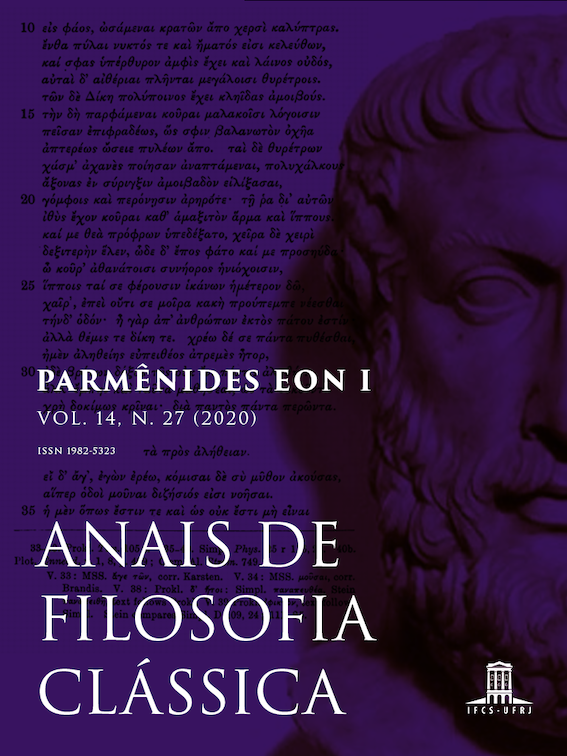The Non-Divinity of Parmenides' What-is
DOI :
https://doi.org/10.47661/afcl.v14i27.38885Mots-clés :
Parmenides, god,Résumé
It is often assumed that Parmenides what-is is, in some sense, divine. This chapter consider the further assumptions that tend to underly such readings. It argues that neither appeals to a broader philosophical tradition nor the possible attribution of intelligence to what-is justify the assumption that what-is is divine. The divinities within Parmenides’ poem are anthropomorphic agents and subjects of change. What-is, in excluding change, also excludes divinity. Divinity is not a relevant or necessary property of what-is.Références
Broadie, S. “Rational Theology,” in A. A. Long (ed.), The Cambridge Companion to Early Greek Philosophy (Cambridge: Cambridge University Press, 1999) 205-224.
Bryan, J., Likeness and Likelihood in the Presocratics and Plato (Cambridge: Cambridge University Press, 2012).
Bryan, J. ‘Reconsidering the Authority of Parmenides’ Doxa’ in J. Bryan, R. Wardy and J. Warren (eds.), Authors and Authorities in Ancient Philosophy (Cambridge: Cambridge University Press, 2018) 20-40.
Coxon, A. H., The Fragments of Parmenides (Las Vegas: Parmenides Publishing 2009).
Journée, G., ‘Lumière et Nuit, Féminin et Masculin chez Parménide d’Elée: quelques remarques’, Phronesis 57 (2012) 289-318.
Kirk, G.S, J. E. Raven and M. Schofield, The Presocratic Philosophers (Cambridge: Cambridge University Press, 1983).
Long, A. A., “Parmenides on Thinking Being,” Boston Area Colloquium in Ancient Philosophy 12 (1996) 125-62.
Mansfeld, J. Die Offenbarung des Parmenides und die menschliche Welt, (Assen: Van Gorcum, 1964).
Mourelatos, A. P. D., The Route of Parmenides (Las Vegas: Parmenides Publishing, 2008).
Palmer, J., Parmenides and Presocratic Philosophy (Oxford: Oxford University Press, 2009).
Sedley, D., “Parmenides and Melissus,” in Long (ed.), The Cambridge Companion to Early Greek Philosophy (Cambridge: Cambridge University Press, 1999) 113-33.
Sedley, D. Creationism and its Critics in Antiquity (Berkeley: University of Californian Press, 2007).
Tor, S., Mortal and Divine in Early Greek Epistemology (Cambridge: Cambridge University Press, 2017).


